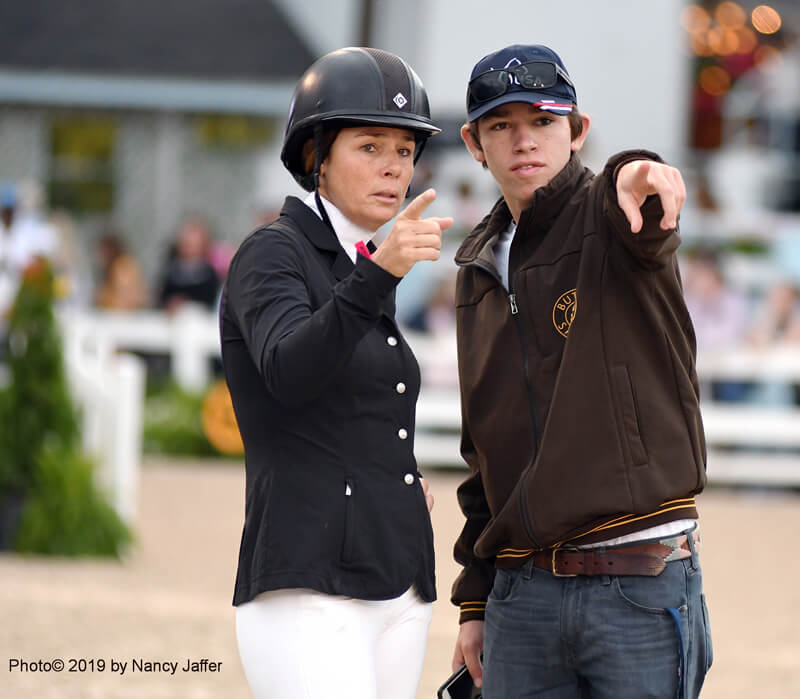U.S. Equestrian Federation members last year sighed and accepted the requirement that they take on-line SafeSport training in order to compete in recognized shows. Then last month, they got word about the federation implementing yet another protocol related to the program that is “committed to ending all forms of abuse in sport.”
That includes bullying, harassment, hazing, physical abuse and emotional abuse, in addition to sexual misconduct and abuse. Sports’ national governing bodies, such as USEF, are required to be part of its mission to “create a positive sport culture.”
USEF took the next SafeSport step by announcing to members in a May 22nd letter the advent on June 1st of its Minor Athlete Abuse Prevention (MAAP), which was approved by the board April 29th. It is part of a Congressional requirement mandating amateur sports organizations and governing bodies to implement policies and procedures limiting one-on-one interaction between athletes who are minors and adults who aren’t their parent or legal guardian.
“We designed these policies to work for equestrian sport,” USEF President Murray Kessler stated in his letter, “but please recognize that they are based on the uniform policies developed by the U.S. Center for SafeSport that will further protect minor athletes.”
The short notice left trainers trying to figure out how they should handle the new mandates affecting the one-on-one meetings and lessons, private social media, email and text messages, as well as restrictions on travel involving minors.
Two days before the June 1st inception, trainer Cindy Cruciotti thought MAAP required that she had to “unfriend” any juniors who were Facebook followers of herself and her daughter, grand prix rider Kelli Cruciotti. That would be quite a task, she pointed out, because she has 5,000 Facebook followers and doesn’t know which are under-age.
However, USEF Senior Vice President and General Counsel Sonja Keating said that trainers can be friends with their students on a Facebook public forum, so they don’t have to unfriend them.
But who knew that? This was 13 days before USEF came out with clarifications relating to five frequently asked questions about MAAP, which requires inclusion of an additional adult on all electronic messages—including phone calls – between an adult and a minor.
Cindy noted the new initiative is difficult “just because we have so much communication we have to have with the minors; scheduling, lessons, things like that.” While she noted, “I’m supportive of what USEF is trying to do,” she added, “There are going to be a lot of changes we have to make.”
Kelli pointed out, “something as simple as `What bridle do you want to ride your horse in?’ will take a bit of getting used to, to do in a different way. We try to get behind the main cause of what they [USEF] are trying to do, even if at first it feels a little overdone. I think in the end it will all end up in the middle.”
Grand prix show jumper, hunter rider and judge Jimmy Torano worries the initiative adds to the difficulty of running a business.
“It’s getting crazy,” said Jimmy, who also had been under the impression he would have to unfriend the minors following him on Facebook.
“I know we need to protect the kids, and a lot of kids have been in bad situations, but this is really getting difficult for the professionals as well,” Jimmy commented.
“God forbid you text one of your students. `Get on at this time’ or `Do this’ and something gets misconstrued. I read today that you had to include an adult in a text. We’re walking on thin ice.”
For her part, grand prix show jumper and trainer Nicki Shahinian-Simpson, said, “I understand the big picture,” then added, “but I think there are a lot of things that don’t really apply and are not realistic for our sport. It’s going to make things really difficult. My initial reaction was I would think (communicating) by text and electronically speaking, it’s on record, so it sort of polices itself.”
MAAP also requires that a one-on-one training session which is not “observable and interruptible” only be conducted with consent of a legal guardian, via a document that must be updated every six months.
Addressing the mechanics of the new program, a USEF spokesperson stated, “We are in the process of extending our MAAP Frequently Asked Questions (which have been available since inception of the new program) based on questions we are receiving around the topic. We also plan on holding Town Halls (meetings) as well as hosting a Facebook Live Q/A around the topic.”
Michele Grubb, a longtime professional jumper trainer, said “I think this whole thing should have started quite a while ago. SafeSport is important to our industry, not only for SafeSport, but for the appearance that we’re cooperating and realizing this can be a problem and we want to address it. I think there’s a lot of over-reaction to it, but I think it’s going to all work out in the end.”
Anne Kursinski, who has received support for revealing the story of abuse she suffered as a child from her trainer, Jimmy Williams, thinks MAAP is a good idea.
As she pointed out, it offers “a frame of reference” in “a huge time of change.”
Anne, who is the U.S. assistant show jumping coach, noted, “kids need guidance,” and it’s important adults in the industry, perhaps with “medals around their necks…aren’t taking advantage of minors…by telling them something that isn’t really right.”
The program “can open the dialogue,” she added, pointing out that in the past, “the secrecy was what kept all the guys safe.”
~Nancy Jaffer

